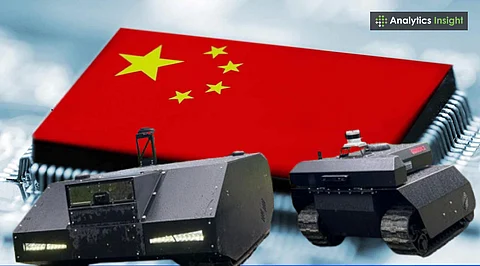
Chinese chipmakers, including major players like Huawei Ascend, Cambricon, Biren, and Moore Threads, have teamed up with AI model startup StepFun to create the “AI-Chip Ecosystem Alliance” in Shanghai. This collaboration aims to enhance the performance and accessibility of AI models on domestically produced chips, particularly in light of Nvidia’s return to the Chinese market. The initiative underscores China’s ongoing efforts to achieve self-reliance in AI technology amid ongoing U.S. export restrictions.
The AI-Chip Ecosystem Alliance is designed to optimize StepFun’s foundational model, known as Step 3, specifically for the local chip manufacturing market. This strategic move not only addresses performance limitations but also aims to diminish reliance on foreign technologies. The alliance represents a significant step in China’s ambition to bolster its domestic AI capabilities.
In a separate development, ARX Robotics, a German defence technology startup founded by former members of the German Army, has successfully raised €11 million in a Series A extension round, bringing its total funding in this round to €42 million. The company specializes in developing autonomous unmanned ground vehicles (UGVs) and a software system called Mithra OS, which retrofits legacy military vehicles. ARX Robotics’ systems have been tested in battlefield conditions, enhancing its position in Europe’s evolving defence landscape.
The funds will allow ARX to expand its production capabilities and further innovate within the realm of software-defined, autonomous defence systems. This move aligns with broader trends in Europe focusing on technological sovereignty and defence innovation, particularly in light of emerging geopolitical challenges.
On another note, Infosys has taken a different approach in the current economic climate, opting against layoffs despite TCS announcing the dismissal of over 12,000 employees. Salil Parekh, the CEO of Infosys, stated that the company plans to hire 20,000 fresh graduates while also investing in AI reskilling for its existing workforce. Parekh emphasized the company’s strategy of leveraging AI for productivity gains and maintaining stability in compensation cycles, which signals a commitment to adaptability amid ongoing shifts in the IT sector.
In the realm of cybersecurity, OpenAI has garnered attention for its autonomous ChatGPT Agent, which recently succeeded in bypassing Cloudflare’s “I am not a robot” CAPTCHA. This incident has raised concerns regarding the effectiveness of current bot detection systems. Operating within a controlled environment, the AI demonstrated human-like behavior without violating any rules, prompting experts to reassess the robustness of traditional online verification methods.
Meanwhile, the U.S. Securities and Exchange Commission (SEC) has approved in-kind creation and redemption for Bitcoin and Ether exchange-traded funds (ETFs). This regulatory change allows authorized participants to exchange shares for cryptocurrency instead of cash, enhancing efficiency and reducing costs. The decision is expected to attract institutional investors and improve liquidity in the cryptocurrency market. Additional approvals also included mixed spot crypto ETFs and options, as well as public consultations on potential large-cap crypto ETF listings.
These developments in technology and finance reflect a rapidly evolving landscape, with significant implications for industry practices and regulatory frameworks. As companies adapt to new challenges and opportunities, the focus on innovation and collaboration remains paramount.







